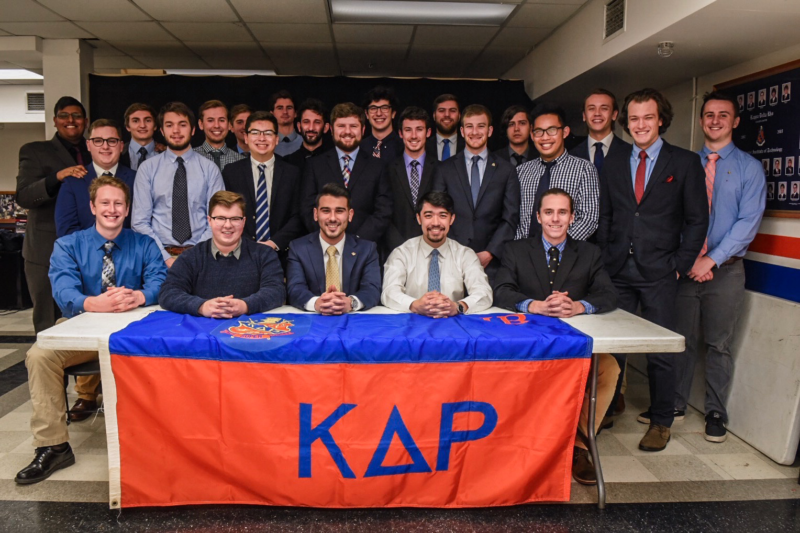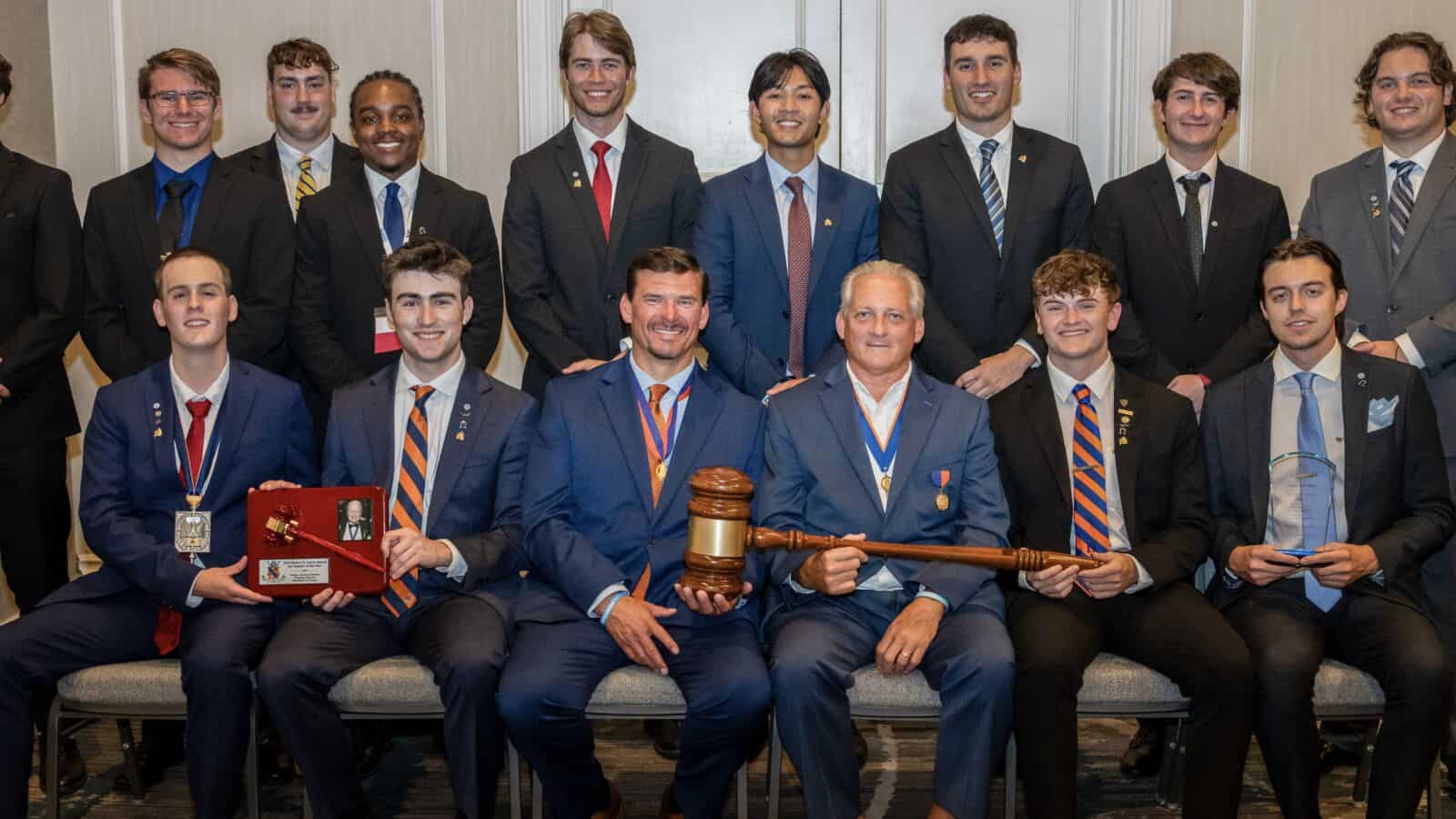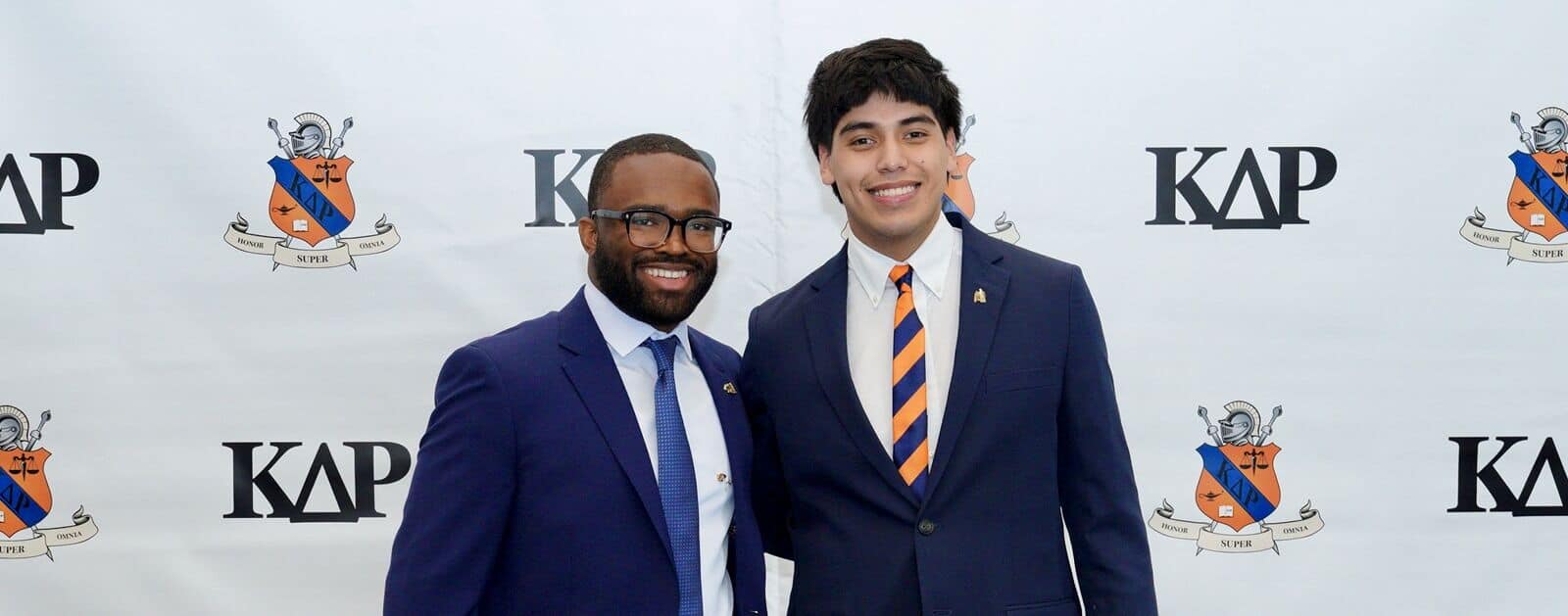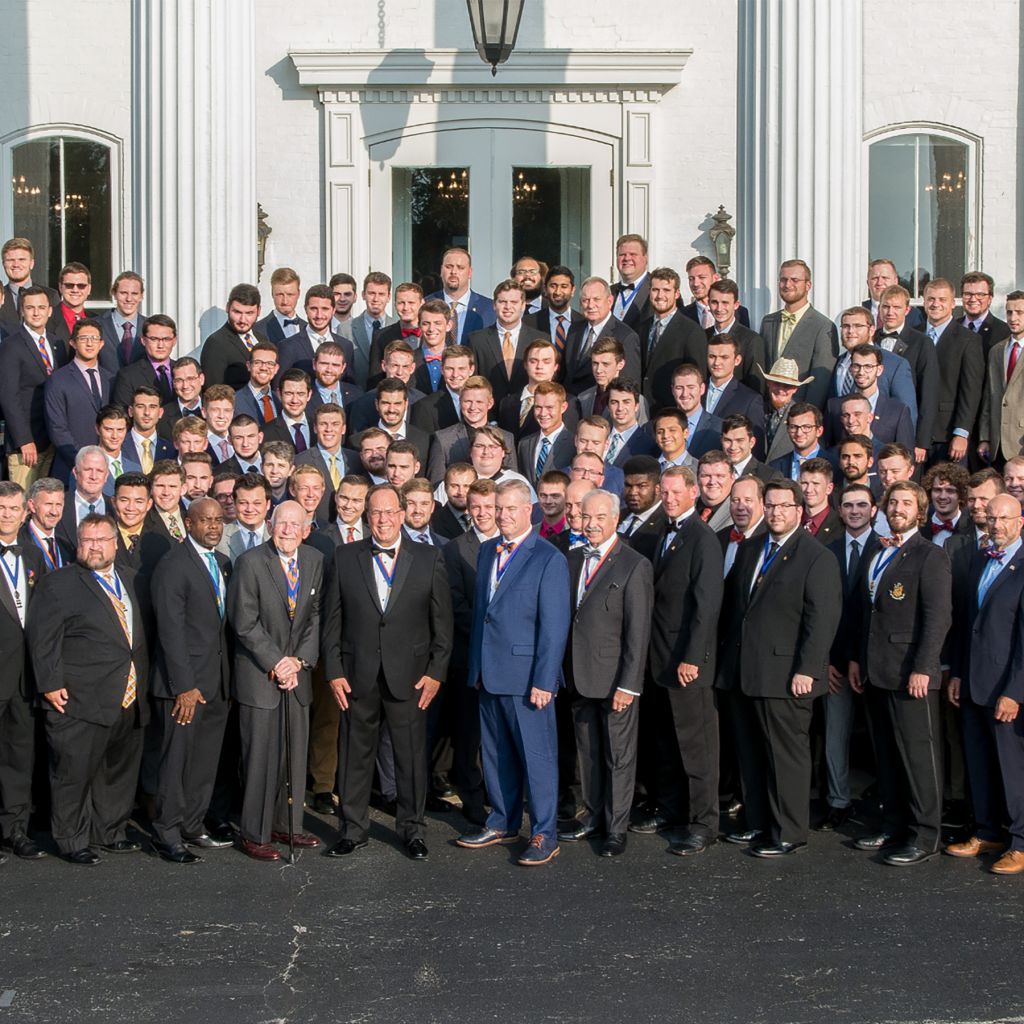
Founder FAQs
Chapter Starter Guide (PDF Guide)
Submit Interest Form
FAQ
Formally known as The National Fraternity of Kappa Delta Rho Incorporated (informally known as KDR). Kappa Delta Rho is a national social fraternity founded in 1905 at Middlebury College, Middlebury, Vermont. Our Mission: Kappa Delta Rho is a lifetime Brotherhood dedicated to the continuing character development of its members through Fellowship, Leadership, Scholarship, Service, and Tradition. Our Vision: To create a living organization that actively challenges each member to rise above everyday pursuits, be of good character, and confront the needs of our modern society by placing Honor Before All Things.
Kappa Delta Rho is a dynamic Brotherhood of men with a common purpose. Brothers hold tight to the principles implicit in our motto, Honor Before All Things, and in being and acting as a KDR Gentleman. We strive to instill the following tenants in our daily lives:
Fellowship: To a KDR, the term Brotherhood represents the bonds of community and friendship that will last a lifetime. The familial bonds are strong and solidified by participation in our ritual. Membership is for life.
Leadership: KDR chapters offer significant opportunities for Brothers to develop leadership skills. Members set chapter policies and standards, must meet national guidelines and expectations, serve in chapter leadership positions, manage budgets, chair committees, and plan community service and social events. These leadership opportunities help Brothers learn how to motivate others, encourage critical thinking, plan effective programs, resolve conflicts, and develop communication and organizational skills. Becoming a Brother of KDR provides the opportunity for involvement in other areas of fraternity and sorority life such as the Inter-Greek Council, Greek Judicial Board, Order of Omega Honor Society, the Interfraternity Council, Gamma Sigma Alpha Honor Society, chapter intramural teams, and so much more. KDR Brotherhood opens the door to campus leadership and involvement.
Scholarship: KDR is committed to the academic success of her members. Often, chapters provide academic resources for Brothers, including planned study sessions and tutoring. Additionally, many chapters offer financial awards and scholarship programs to encourage scholastic achievement. The KDR Foundation awards over $75,000 annually in scholarship monies for undergraduate and graduate study. KDR is also unique in that we offer an automatic $100 scholarship to new members during the semester in which they join and are initiated as long as the Brother is in good standing and completes the semester with at least a 3.0 cumulative GPA.
Service: One of the most gratifying parts of being a KDR is the sense of satisfaction and pride that comes with involvement in community service and philanthropic events. Each chapter has its own philanthropic and service events and activities. One commonality, however, is that each KDR chapter annually sponsors events in support of kids as part of our national philanthropy: KDR Kids. Each year, KDR donates thousands of dollars and hours of time to local and national charities through volunteering, fundraising, and other projects.
Tradition: Both undergraduate and alumni KDR Brothers come together to celebrate annual traditions such as Homecoming, Reunion Weekends, the Red Rose Formal, initiations and ritual ceremonies, philanthropic activities, and Greek Week. Mixers, formals, cookouts, theme parties, and other social events provide opportunities to socialize within the organization and to meet other students on campus. Nationally, KDR hosts, the Elmon Williams Leadership Academy, National Convention, Consuls Academy, and alumni events and trips.
Recruitment and the manner in which it occurs can vary greatly from campus to campus. Some schools may have a more formal recruitment period for unaffiliated students interested in joining a fraternity. Others utilize a more informal process that differs from chapter to chapter. Many times a student must register to participate through the school’s Greek Life or Student Affairs office. Whatever the method, membership in KDR is offered by the extension of a bid to potential new member. Acceptance of the bid is the first step, followed by official pledging in the pledge ceremony and the beginning of The Path program, culminating in initiation and followed by additional training on The Path.
The KDR membership education program is called The Path. It begins immediately following the official pledging of new members and is broken into four stages: Orientation, Kappa, Delta and Rho, with each stage having about a dozen stages. The program is conducted under the guidance on the chapter’s Junior Tribune and Pontifex with the mentoring of a big brother. The Orientation Stage lasts approximately 5 weeks and is followed by initiation. Another 5 weeks of required Kappa Stage training follows with the remaining portions of the Kappa, Delta and Rho stages being optional for all brothers, but offering additional training and education related to our core standards and values. The Path program is delivered electronically, is nearly paperless and environmentally friendly and guides the new Brother to involvement and full participation in the chapter and on a national level.
Hazing is a serious infraction of KDR policy and of state and federal law. Hazing is defined as any action taken or situation created, whether on or off college grounds, that is harmful or potentially harmful to an individual’s physical, emotional, or psychological well-being, regardless of an individual’s willingness to participate or its bearing on his membership status. Should you see or hear of ANYTHING that might be construed as a violation of the guidelines, please contact your college’s Office of Greek Life and the KDR National Office. Any information you may provide will be taken seriously and investigated fully.
As private organizations, fraternities are self-sufficient entities that require membership dues. Membership dues are set on the local or chapter level and are used to sponsor social events, membership recruitment, programming in support of scholarship and leadership, and philanthropy projects. Financial obligations in terms of chapter dues, housing, or meal plans vary from chapter to chapter. National fees are the same for all chapters and include: a one time pledge fee, a one time initiation fee, and an annual assessment and risk management fee. Most chapters provide their members with several payment plan options and potential new members should speak with the quaestor (treasurer) to discuss these prior to accepting a bid.
The time commitment varies from chapter to chapter, but the first semester is most time intensive as the new member goes through the chapter’s Education Program. The time spent in this program will give your student the opportunity to develop their leadership and time management skills, learn about the history and tradition of the organization, develop friendships with their new member class as well as the rest of the chapter, and allow them to become involved in other activities and organizations. After the initiation into the chapter, expectations will vary. Each chapter has weekly chapter meetings and other mandatory events (philanthropies, service, and initiation) throughout the year, but they are planned well in advance. Students can make their KDR experience as extensive as they like. Some Brothers spend many hours a week with their chapter, participating in intramural athletics, holding an executive office, or attending social functions while others may limit their time to chapter meetings and events. The more time a Brother spends with the members in their organization and at chapter activities, the more benefits a student will receive from their membership. Just like any other activity, the more you put into it, the more you will get out.
Nobody likes stereotypes, and over the years, fraternity men have been caricatured, lampooned, and portrayed in an unflattering manner by movies and television. This is not to say that members of the fraternity system have not committed some major offenses. Yet, when the number of students committing these acts is viewed in the context of the fraternal system, they represent less than one-one-hundredth of one percent of the total membership. The media does not play up the positive values of fraternity life because they do not perceive these values to have “entertainment value,” but those ideals are much more characteristic of fraternity life than is the “Animal House” caricature. KDR and The Path program instill a commitment and pride in our organization and in her core values. Unfortunately, since only 2% of the U.S. population is Greek, most people don’t have first-hand experience and stereotypes become the norm. Greek organizations do hold social events, but most of these do not include alcohol. These “social” events include educational programs/workshops, community service events, intramural sports, Parent’s Days, Homecoming, Greek Week and date events in addition to parties and mixers. Today’s fraternity and sorority communities across the nation have adopted a stringent approach to socializing thereby creating a safer, more beneficial environment for its members. There are strict guidelines and procedures concerning the availability of alcohol at chapter events, and these rules are enforced by the national organizations, the University, and by internal chapter standards.
The social life of fraternity men can be very rich and rewarding, with life-long friendships, lifetime, and the development of social skills which will be useful to any adult. KDR provides activities which sharpen conversation techniques, conflict resolution skills, and promote poise and a sense of social grace. KDR advocates the legal, responsible use of alcohol by members and works to ensure that this responsibility is taken seriously.
Talk to your son about Kappa Delta Rho and ask questions about the Fraternity system at their college. Make sure your son is aware of their commitments and expectations of membership. Ask questions about their own perception and what they feel KDR will offer them. Allow them to make the best decision for themselves. Once your son decides to join KDR, there will be opportunities for Parent’s Weekend activities, and attending chapter events and activities. Get involved and keep the lines of communication open by taking the time to talk to your so about KDR, their college experience and how you can be of support.
The first general fraternity for which records exist was the Flat Hat Club, organized in 1750 at the College of William and Mary in Williamsburg, Virginia. The members met periodically in an upper room of the Raleigh Tavern, and over a bowl of punch, their laughter reportedly shook the house. Thomas Jefferson, author of the U.S. Declaration of Independence and third President of the United States, was a student member of this club. The first Greek-letter society came into being because a student had been refused admission into a William and Mary organization known as PDA. The PDA club was supposedly a literary society but had long lost those purposes. The rejected man was a superior Greek scholar. With four friends, he organized a society of his own, using Greek letters to name it: Phi Beta Kappa. The first meeting of Phi Beta Kappa took place on December 5, 1776. It was a secret meeting, for the faculty of William and Mary at the time did not approve of its students discussing the pressing issues of the day and possibly straying too far from accepted beliefs. So Phi Beta Kappa developed appropriate signals of challenge and recognition. They met weekly at the Apollo room of the Raleigh Tavern in Williamsburg.
After two years, Phi Beta Kappa felt that other campuses should share in its experiment, that the higher education experience should provide consideration in preparing the student for his future responsibilities by also preparing his social skills. Thus, chapters were founded at several American colleges. As time went on, Phi Beta Kappa became purely intellectual in its aims; its original cardinal principles were “literature, morality and friendship.” During anti-secret movements of the 1830s, Phi Beta Kappa, the society, voluntarily revealed its once secret Greek name, Filosofia Bion Kuberneqes (Philosophia Bios Kybernethes), or “Philosophy (is the) guide to life.” Today, Phi Beta Kappa is a scholastic honorary society that recognizes undergraduate men and women who show superior achievement in academics in more than 184 college campuses across the nation.
The secret grip and ritual, the distinctive badge, and the use of Greek letters — all were used by Phi Beta Kappa and were adopted by subsequent Greek letter fraternities and sororities. However, the most important legacies of Phi Beta Kappa are these: high moral ideals, scholastic advancement, and the friendship of brothers or sisters with each other.
Fraternities and sororities are student organizations whose primary purpose is the personal development of their members, as distinguished from honorary, professional, departmental, and service fraternities. Unlike most other student organizations, membership in a social fraternity or sorority is a lifetime affiliation, and students are not permitted to be initiated into more than one fraternity or sorority.
Fraternities and sororities promote intimate relationship bonds of brotherhood/sisterhood and members typically refer to fellow members as “brothers” or “sisters.” Traditionally, most fraternities and sororities are designated by Greek letters; hence, they are often referred to as “Greek organizations,” “the Greek community,” or simply “Greeks.” Fraternities and sororities typically have rituals and creeds that promote ideals such as friendship, loyalty, academic achievement, intellectual development, service to the community and alma mater, honor and integrity, leadership, and personal responsibility. Many fraternities have an indoctrination and orientation period prior to initiation, and pre-initiated members are commonly referred to as pledges, associates or associate members, candidates, intakes, or new members. Some fraternities and sororities are culturally and/or community based.
Fraternities and sororities may select members according to subjective criteria consistent with college/university nondiscrimination policies. They are entitled to single-gender membership, provided they qualify under the provision of Section 86.14 of the regulations promulgated under Title IX of the U.S. Education Act of 1972, which require that the organizations be exempt from taxation under section 501(a) of the Internal Revenue Code of 1954. The content in this section was adapted from material created by the Office of Fraternity & Sorority Life at The University of North Carolina — Chapel Hill.
Feel free to contact us for assistance with any KDR related questions, visit the website for Greek Life at your son’s college or visit one of the resource sites listed below for more information:
Greek Professional Associations & Governing Bodies
- Association of Fraternity Advisors (AFA)
- Fraternity Executives Association (FEA)
- North-American Interfraternity Conference (NIC)
Greek Honor Societies
Other Links
- Center for the Study of the College Fraternity (CSCF)
- Fraternity Communications Association (FCA)
- Fraternal Information & Programming Group (FIPG)
- HazingPrevention.org
- North American Interfraternal Foundation (NIF)
- Stophazing.org – Hazing Laws by state
- The BACCHUS and GAMMA Peer Education Network
- TIPS: Training for Intervention Procedures
Alpha (al-fah) Beta (bay-tah) Gamma (gam-ah) Delta (del-tah)Epsilon (ep-si-lon) Zeta (zay-tah) Heta (ay-tah) Theta (thay-tah)Iota (eye-o-tah) Kappa (cap-ah) Lamda (lamb-da) Mu (mew)Nu (new) Xi (zie) or (zee) Omicron (om-i-cron) Pi (pie)Rho (row) Sigma (sig-mah) Tau (taw) Upsilon (oop-si-lon)Phi (fie) Chi (kie) Psi (sigh) Omega (o-may-gah)
My son is using some words that I do not understand. What do all of these new words mean? A short list of some Greek Life and KDR related terms you may hear your son using is listed below:
ALUMNI ASSOCIATION /CORPORATION: An organization of alumni Brothers. The association may be based on a geographical location or chapter. An Alumni Corporation is a legal entity with a Board of Directors and may be the holding company for the chapter house or property.
ALUMNUS: A graduated member of a men’s fraternity: Plural Alumni. Alumni often support chapter activities through donations, assistance with advising, employment of undergraduates, etc.
BADGE/PIN: The official pin of an initiated member indicating full membership in the Order.BID: A formal invitation to join KDR.
BID DAY: The last day of formal recruitment when new members accept their bids and officially join their new organization.
BIG BROTHER: An undergraduate Brother who serves as a mentor for newer members.
BROTHER: A term used by fraternity members to refer to one another.
BYLAWS: Rules made by the local chapter or in conjunction with national policies to administer chapter affairs.
CEREMONY OF LIGHT: The Big Brother/Little Brother Ceremony of KDR.
CHAPTER: A local group of the larger inter/national organization. KDR Chapters are denoted by a one or two letter Greek name, examples Lambda Chapter at The University of California Berkeley and Zeta Beta Chapter at Tarleton State University.
CHAPTER ADVISOR: An alumnus who establishes and maintains a close advisory relationship with a chapter and serves as a teacher, counselor, and friend to the chapter and her officers. The Chapter Advisor may be just one of many Brothers serving on the Chapter Alumni Advisory Board.
CLOSED RELATIONS: A period of time when conversation and contact between potential new members and fraternity undergraduate and alumni members are strictly limited by the recruitment guidelines, see also SILENCE.
CONTINUOUS OPEN BIDDING/RECRUITMENT: A process that allows chapters to continuously recruit and bid new members outside of the formal recruitment period.
ELMON WILLIAMS LEADERSHIP ACADEMY: Annual leadership and educational training seminar for undergraduate Brothers, held in the days immediately prior to the National Convention.
FACULTY/STAFF ADVISOR: A faculty/staff member who is the organization’s representative to the university and who advises the organization on university matters.
FORMAL RECRUITMENT: Usually a period of time with structured events set aside by the Interfraternity Council for chapters to meet potential new members.
FRATERNITY: The name applied to all Greek-letter organizations. Informally, this name applies to men’s groups while women’s organizations may be sororities or female fraternities.
GAMMA SIGMA ALPHA: A national academic honor society for fraternity and sorority members.
GREEKS: Members of a fraternity or sorority. The term Greek is used because a majority of fraternities and sororities use Greek letters to distinguish themselves.
GREEK ORGANIZATION: A fraternity or sorority (social, honor, or professional) See Also Greeks.
GREEK WEEK: An annual celebration in which chapters participate in educational, social, and service events. It is a time for all Greek organizations to unify.
GROUP OF INTENT: An initial group of students formed on a college or university campus in hopes of becoming a provisional chapter and then chartered chapter of Kappa Delta Rho Fraternity.
HAZING: Any conduct which subjects another person, whether physically, mentally, emotionally, or psychologically, to anything that may endanger, abuse, degrade, or intimidate the person as a condition of association with a group or organization, regardless of the person’s consent or lack of consent. KDR does not tolerate hazing in any shape or form.
HONOR SUPER OMNIA: KDR’s open motto which is Latin for Honor Before All Things, appears on the scroll at the bottom of our Coat of Arms.
INITIATION: The formal ceremony that brings a new member into full Greek membership. Each chapter has a different set of requirements that must be met in order to be initiated.
INTERFRATERNITY COUNCIL (IFC): The governing body of the NIC recognized fraternities at a university. IFC manages the Formal Recruitment process.
KDR KIDS: KDR realizes that philanthropies and community service opportunities vary from campus to campus. Therefore, KDR adopted no one national philanthropy, but instead chose to encourage chapters to focus some of their efforts on those areas related to assisting children.
LEGACY: Someone whose mother, father, sister, brother, grandmother, or grandfather is an initiated member of a specific Greek organization.
LITTLE: Short for “little sister” or “little brother”; a newer member who is mentored by an older member of the organization.
NATIONAL CONVENTION: KDR meets in convention annually usually around the first week of August each summer. Convention is the supreme governing and policy body of the Fraternity.
NATIONAL PAN-HELLENIC COUNCIL (NPHC): The governing body of nine nationally recognized, historically black fraternities and sororities.
NATIONAL PANHELLENIC CONFERENCE (NPC): The governing body for 26 national and international sororities and female fraternities.
NORTH AMERICAN INTERFRATERNITY CONFERENCE (NIC): A conference of men’s private fraternities founded in 1909, which includes 72 member national and international fraternal organizations comprising 5500 chapters in the United States and Canada.
NEOPHYTE: Term used for a pledge following the completion all pre-requisites for membership and the actual initiation ceremony.
NEW MEMBER: A potential member who has accepted the bid of a fraternity/sorority, but who has not been initiated.
NEW MEMBER EDUCATOR: The chapter officer who oversees the development of new members and prepares them for initiation.
NEW MEMBER PROGRAM: The period of learning about fraternity and sorority life prior to initiation. In addition to learning the history of the organization, new members may attend presentations on topics such as study skills, acquaintance rape, substance abuse, and other important issues.
OFFICERS: KDR’s officers get their names from Ancient Rome and include: Consul (President), Senior Tribune (Vice-President for Recruitment), Junior Tribune (Vice-President for New Member Education), Praeter (Secretary), and Queaseter (Treasurer) to name a few.
OPEN RECRUITMENT: The period after Formal Recruitment in which fraternities may recruit and offer bids without scheduled events through IFC.
ORDER OF OMEGA: A national academic and leadership honor society for fraternity and sorority members.
ORDER OF THE PEREGRINE FALCON: An undergraduate giving society for KDR Brothers.
PANHELLENIC COUNCIL: The governing body for inter/national sororities and female fraternities on a college campus.
PATHFINDER: The pledge manual and historical reference book given to all new members/pledges.
PHILANTHROPY: Community service events done by fraternities and sororities to raise money for local and national charities. Each organization has their own philanthropy to which they donate time, money, and energy, see also KDR KIDS.
PIN (TWO TYPES): The active pin or badge which signifies an active/initiated member and the new member/pledge pin which is the insignia that designates a new member in a particular group.
PLEDGE: see “New Member.” Term is derived from the oath or pledge made by the new member to affiliate with and pledge themselves to the organization.
PLEDGE CEREMONY: The official ritual whereby the pledge is pinned and commits or pledges to join the Fraternity.
PLEDGE PIN: The pin worn by a pledge of the fraternity for the duration of their pledge period. An outward and visible sign of their commitment or pledge to the Fraternity.
POTENTIAL NEW MEMBER: A college man or woman who is participating in Recruitment.
PREFERENTIAL BIDDING: The process of mutual selection between Panhellenic sororities and potential new members.
PROVISIONAL CHAPTER: A student organization in the final stage before being installed as a charted chapter of an inter/nationally affiliated organization.
QUOTA: A specified number of women a Panhellenic sorority may offer bids to during formal recruitment.
RECRUITMENT COUNSELOR: An initiated member of a Panhellenic sorority who guides potential new members through the formal recruitment process.
REGIONAL CONCLAVES: KDR’s chapters are divided in regions and each year the region’s chapters meet in conclave for educational and leadership training.
RITUAL: The traditional beliefs and oaths of a sorority or fraternity usually used in reference to the Ceremonies of Initiation as well as weekly chapter meetings. These traditions do not include any forms of hazing, because hazing weakens the bonds of brotherhood / sisterhood, and undermines the common experience of the fraternity or sorority. Ritual does, however, ensure that all members share a common experience across multiple campuses and generations.
ROME/ROMAN: KDR takes her nomenclature from ancient Rome, see Officers.
RUSH: see “Formal Recruitment.”
RUSH CHAIR: The person from each fraternity or sorority who is in charge of each chapter’s rush functions.
SHAKE: A term used on some campuses to define a mutual agreement between a potential new member and a chapter that an offer of membership will be extended and accepted at the appropriate time, short for Handshake.
SILENCE: A period of time when conversation and contact between potential pledges and undergraduate and alumni Brothers of Greek organizations is strictly limited by recruitment rules.
SISTER: An initiated member of a sorority/women’s fraternity. It is used as a form of address when one initiated member refers to another member.
SORORITY: A group of women joined together in friendship for leadership and academic purposes.
THE PATH: The KDR Membership Development Program. All pledges complete certain required educational training and orientation to the Fraternity prior to and following initiation. Optional sections continue at the Brother’s own pace and are self directed.
UNDERGRADUATE BROTHER: A member who has been initiated into lifelong fraternity/sorority membership and is active at the collegiate level.




